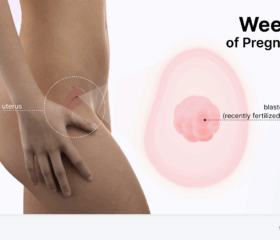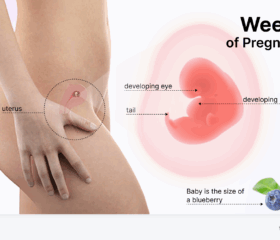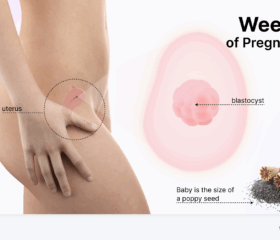How to Prepare for Pregnancy: Conception Planning, Body Care, and Tips
If you're ready to have a baby, you might need to trade in your morning coffee for prenatal vitamins—at least for a while.

- How to prepare your body for pregnancy
- How to prepare for pregnancy by predicting your fertile window (ovulation)
- How to prepare your mind for pregnancy
- How to create a strong support system before pregnancy
- How to prepare your finances for pregnancy and parenting
- How to reduce your environmental risks before pregnancy
- When to speak to your doctor about getting pregnant
- Final thoughts
Starting a family is a huge decision that begins long before you see that positive pregnancy test. A lot of preparation is involved to ensure you’re physically, mentally, emotionally, and financially ready to have a baby.
Read on to learn how to make the transition to the next stage of your life as smooth as possible.
How to prepare your body for pregnancy
Your physical health is a major factor in your ability to conceive and have a healthy pregnancy. Fortunately, it often only takes a few simple lifestyle changes to get your body primed for a child.
You should:
- Schedule a preconception checkup: If you decide to try for a baby, set up a preconception appointment with your doctor, OB/GYN, or midwife. They will perform the necessary screenings to check your overall health and any potential risks to you and your baby’s well-being. This can include doing genetic testing if you or your partner has a family history of certain medical conditions.
- Review your medications: Be honest with your doctor about what you’re taking, including prescription drugs, alcohol and substance use, over-the-counter medications, herbal remedies, and supplements. Certain medications or substances can impact your fertility, pregnancy, and your baby’s development. Your doctor needs an in-depth understanding of your current lifestyle to give you personalized recommendations.
- Start taking prenatal vitamins: Your doctor may recommend a daily prenatal vitamin, which you should start taking at least one month before trying to conceive. These supplements usually include beneficial nutrients like folic acid, choline, omega-3 fatty acids, and vitamins C, D, and B.
If you’re unsure of what lifestyle changes you need to make before getting pregnant, your doctor will almost certainly be able and willing to give you pointers.
What to know about stopping birth control
If you’re using a contraceptive implant, you’ll need to schedule a removal procedure; you can only take it out with the help of your healthcare provider. You can get pregnant as soon as you get it removed. 1 2
If you’re using a hormonal form of birth control (e.g., pills, patches, or rings) or a barrier method (condoms, diaphragms, jellies, etc.), it’s possible you’ll be able to get pregnant as soon as you stop using it. However, remember that you might not get pregnant right away. Even if you have no fertility issues, it may take several months of trying.
How to establish healthy lifestyle habits
Healthy habits set the foundation for your pregnancy. Being in good shape can reduce your risk of preterm labor, high blood pressure, gestational diabetes, and your baby’s risk of birth defects of the spine, brain, and heart. 3
Start by:
- Staying active: Get regular exercise before, during, and after pregnancy. Before conceiving, you’ll want to aim for at least 150 minutes of moderate to intense aerobic exercise each week (30-minute sessions five days a week). These workouts should get your heart pumping—fast-paced walking and swimming are ideal choices to add to your pre-pregnancy workout plan. Start slowly, and don’t overexert yourself. 4
- Watching your diet: Ask your doctor what to eat to get pregnant faster, but in general, you can fuel your body with fruits, vegetables, lean proteins, whole grains and healthy fats. A well-rounded diet ensures that you’ll get all the necessary nutrients to boost your fertility, prevent pregnancy complications, and regulate your hormones. You should also avoid eating fish with high mercury levels, although you can have salmon, canned tuna, and shellfish. 5 6
- Avoiding alcohol: This can affect both you and your partner’s fertility, and it’s best to stop consuming it if you’re trying for a baby. As you probably know, it’s also a complete no-no if you actually do conceive; it can lead to pregnancy loss (miscarriage and stillbirth), preterm labor, sudden infant death syndrome (SIDS), and fetal alcohol spectrum disorders (FASDs), which can cause physical, learning, and behavioral issues in your child. 7 8
- Limiting caffeine: While the research on the effects of caffeine on fertility is inconclusive, a good precautionary measure is to keep your caffeine consumption at the level advised for pregnant women, which is 200 mg per day (equivalent to one 12-oz cup of coffee, one can of cola, or two bars of plain chocolate). 9 10
- Quitting smoking and recreational drugs: Using drugs or smoking while trying to conceive can hurt your chances of getting pregnant and affect the healthiness of your pregnancy. This is true for both you and your partner; for example, cannabis can lower a man’s sperm count, which can make it harder to conceive. 11 12
If you have difficulty quitting bad habits and adjusting to a healthier lifestyle, ask your doctor for help.
Why dental health is important for pregnancy
If you have tooth decay or gum disease, it could affect your pregnancy, causing preterm labor, low birth weight, and complications like preeclampsia. 13
It’s important to schedule a dental checkup. Your dentist will be able to address any issues (hidden or obvious) and give you tips to avoid poor dental hygiene that may affect your pregnancy.
How to prepare for pregnancy by predicting your fertile window (ovulation)
To successfully get pregnant, you’ll need to have sex when you’re ovulating. Ovulation usually happens at the midway point of your cycle (around day 14 in a regular 28-day cycle).
Keep in mind that sperm can survive inside your reproductive tract for up to 5 days. For the best chances of success, aim to have sex every day or every other day in the five days leading up to ovulation, as well as the day you ovulate and the day after. 14
How to know when you’re ovulating
Many women who want to get pregnant start tracking their menstrual cycles so they can accurately determine when they’re ovulating. There are a few tools and methods you can use, such as:
- Ovulation calculators: These tools take the average length of your menstrual cycle to estimate when you’re likely to ovulate. Keep in mind that ovulation calculators usually work under the assumption that you, like many women, have a regular 28-day cycle. If you’re trying to track ovulation with irregular periods, you’re best off speaking to your doctor.
- Ovulation predictor kits (OPK): OPKs or ovulation test strips work by detecting luteinizing hormone (LH) in your urine, which surges in your body as you get closer to ovulation. You’ll need to use ovulation test strips over multiple cycles to identify your LH surge.
- Charting your basal body temperature (BBT): Your BBT is your body’s lowest temperature at rest. Many women claim that around ovulation, their BBT slightly increases. However, this method has limited scientific backing, and factors unrelated to ovulation could also cause your BBT to rise. You’ll need a special basal thermometer capable of measuring two decimal places.
- Tracking ovulation symptoms: Many women have noticeable symptoms when they ovulate. For instance, your vaginal discharge may change in texture, with ovulation discharge often resembling raw egg whites. However, since not all women experience these symptoms, this also isn’t the most reliable way to identify your fertile window.
Your best bet is to use multiple methods in conjunction with each other. You can try using a fertility or ovulation tracker app. The best fertility trackers allow you to keep tabs on your symptoms, BBT, and the results from your OPKs more easily.
How can you track ovulation and prepare for pregnancy with irregular periods?
Many of the ovulation methods we highlighted above work under the assumption that you have a regular 28-day cycle.
If you’re trying to get pregnant with irregular periods, it can be harder to figure out exactly when you’re ovulating.
Still, that doesn’t mean you won’t be able to successfully conceive. You’ll just need a little more help from your doctor to identify your fertile window.
You may find that OPKs are a more useful way of tracking your ovulation, though you’ll probably have to use them over the course of a few months, so you can figure out what an LH surge looks like for you.
How to prepare your mind for pregnancy
Your mental health is just as important as your physical health, and it can have a big impact on your chances of conceiving.
To effectively care for your mental well-being, be sure to:
- Manage stress: Trying to conceive can be stressful, so find healthy ways to cope, such as exercising, meditating, doing yoga, or spending time outdoors. Keeping your stress levels low maintains your hormone levels and helps regulate ovulation, both of which are potential factors affecting your fertility. 15
- Prioritize sleep: Try to always get a good night’s rest. Inconsistent sleep throws off your menstrual cycle and makes it harder to track your ovulation (and conceive). You should aim for 7–8 hours of sleep each night.
- Address mental health concerns: If you have a history of mental health conditions like depression or anxiety, chat with your doctor before trying to conceive, as they can play a role in infertility. Around 40% of women facing infertility also have a psychiatric diagnosis, most commonly depression or anxiety. Make sure you have a plan in place to manage your mental health and get professional help if you need it. 16
How to create a strong support system before pregnancy
Before you get pregnant, make sure everyone around you is on the same page about your plans. You don’t necessarily have to tell everyone in your family, but ideally, you’ll have some sort of support system in place. Pregnancy and motherhood can both be challenging, and a little help goes a long way.
That means you’ll need to:
- Have important conversations: If you have a partner, make sure both of you are ready to expand your family. Ask the difficult but necessary questions, like what your parenting styles are or whether your career and lifestyles align well enough to create a suitable environment for your baby.
- Effectively communicate: Open and honest communication with your loved ones is important so that you can navigate the difficulties of pregnancy, labor, and parenting. Express your feelings, needs, and concerns in a healthy and constructive way while also listening to your loved ones. To survive the highs and lows of parenting, conflict resolution is a necessary skill.
- Make time for each other: It’s easy to get swept up in the excitement of having (and making) a baby, but don’t forget about spending quality time with your loved ones. Whether that means date nights with your partner, spa days with your girlfriends, or even just walks with your relatives, nurturing your relationships now will make it easier to stay connected when your baby takes center stage.
You can also try reaching out to other parents and asking about their experiences, especially if it’s your first time. Of course, pregnancy is a personal decision, so it’s up to you who you share your plans with.
How to prepare your finances for pregnancy and parenting
It’s no secret that parenting isn’t cheap. You’ll need to plan your finances in advance so you don’t get blindsided by the hefty costs that come from raising a child. According to a 2023 study, these may set you back by over $29,000 per year.
You can get your finances squared away by:
- Creating a baby budget: When you tally up your anticipated expenses, consider prenatal care, delivery, baby gear, and the ongoing costs of raising a child. Your costs may vary by location, so use a calculator tool and do some research to get a general idea of what those expenses might be.
- Building up savings: Start a rainy day fund to cover any unexpected expenses during and after your pregnancy, like unexpected procedures, a prolonged hospital stay, or additional medical treatments for your baby. While you hopefully won’t have to use this fund, you’ll hopefully get some peace of mind from having a financial cushion.
- Exploring employer benefits: You’ll need to plan for any loss of income incurred, so look into any maternal/paternal benefits offered by you or your partner’s employer. You may also be entitled to mandatory paid leave while you’re out of commission if you live in one of the thirteen states (or the District of Columbia) that have adopted this family leave system. 17
Check your health insurance policy
Make sure you’re clear on what your insurance policy covers. You should also research the providers in your network and familiarize yourself with your deductibles and out-of-pocket expenses. For instance, many insurance policies don’t cover in vitro fertilization (IVF). 18 If you have a choice of plans, compare them to find the most cost-effective one for you.
How to reduce your environmental risks before pregnancy
There’s more to protecting your and your future baby’s health than hospital checkups and vitamins. Your environment may have invisible hazards that could affect your chances of getting pregnant—or cause problems once you conceive.
Here are a few key environmental risks to be aware of:
- Workplace hazards: Talk to your boss about changing your employment situation if your job involves exposure to chemicals or radiation, or if your job places you in physically demanding conditions or extreme temperatures (something that’s common in healthcare, law enforcement, or construction and manufacturing).
- Toxins: Be mindful of harmful endocrine-disrupting chemicals (EDCs), like pesticides, parabens, phthalates, and bisphenols (BPA, BPS, BPF). You can reduce the risk of these interfering with your fertility by washing fruits and vegetables, eating less processed and prepackaged food, and minimizing your use of plastic while drinking, eating, or heating food. 19
- Parasites: Washing your fruits and veggies also lowers your risk of contracting toxoplasmosis, a condition caused by the foodborne parasite Toxoplasma gondii. Getting toxoplasmosis while you’re pregnant can result in visual and hearing impairments and intellectual disabilities in your baby. You should also steer clear of undercooked meat, dirty cat litter boxes, and any outdoor places where cat feces can be found. [20
When to speak to your doctor about getting pregnant
Once you decide you want to have a baby, book a preconception appointment with your OB/GYN. Even if everything goes smoothly, it’s worth getting checked out as you head into this phase of your life.
You should also let your doctor know if you’re having trouble conceiving, such as if you:
- Are under 35 and have been trying to conceive for over a year
- Are over 35 and have been trying for over six months
- Have a family history of early menopause
- Have a history of complications with your fallopian tubes
- Have irregular menstrual cycles
Your doctor can assess whether an underlying medical condition is affecting your fertility and give you tailored advice to help you conceive.
If necessary, they can also let you know about assisted reproductive technologies, such as intrauterine insemination (IUI) or in vitro fertilization (IVF), that you can look into if you’re struggling to get pregnant naturally.
Final thoughts
Preparing for pregnancy isn’t just about picking out cute baby names; it’s about making sure you lay the proper foundations so that you’re physically, emotionally, and financially ready to bring home your baby.
Look after your health (both mental and physical) and plan carefully. Before you know it, you’ll be all set!
Article Sources
- University of Utah Health. "How to Transition off Birth Control for a Healthy Start to Pregnancy" Retrieved October 31, 2025.
- Healthline. "Your FAQ Answered: Getting Pregnant After Birth Control" Retrieved October 31, 2025.
- March of Dimes. "Healthy weight before pregnancy" Retrieved October 31, 2025.
- Office of Disease Prevention and Health Promotion. "Stay Active During Pregnancy: Quick Tips" Retrieved October 31, 2025.
- Frontiers in Nutrition. "How the intricate relationship between nutrition and hormonal equilibrium significantly influences endocrine and reproductive health in adolescent girls" Retrieved October 31, 2025.
- Better Health Channel. "Mercury in fish" Retrieved October 31, 2025.
- Centers for Disease Control and Prevention. "Alcohol Use Effects on Men's and Women's Health" Retrieved October 31, 2025.
- Centers for Disease Control and Prevention. "Alcohol Use, Screening, and Brief Intervention Among Pregnant Persons — 24 U.S. Jurisdictions, 2017 and 2019" Retrieved October 31, 2025.
- American College of Obstetricians & Gynecologists. "How much coffee can I drink while I'm pregnant?" Retrieved October 31, 2025.
- Tommy’s. "Limiting your caffeine intake in pregnancy" Retrieved October 31, 2025.
- Centers for Disease Control and Prevention. "Health Effects of Cigarettes: Reproductive Health" Retrieved October 31, 2025.
- Your Fertility. "Recreational drugs" Retrieved October 31, 2025.
- Tasmanian Department of Health. "Dental health before and during pregnancy" Retrieved October 31, 2025.
- American College of Obstetricians & Gynecologists. "Trying to Get Pregnant? Here’s When to Have Sex." Retrieved October 31, 2025.
- Frontiers in Global Women's Health. "Chronic Stress and Ovulatory Dysfunction: Implications in Times of COVID-19" Retrieved October 31, 2025.
- American Psychiatric Association. "Infertility: The Impact of Stress and Mental Health" Retrieved October 31, 2025.
- Bipartisan Policy Center. "State Paid Family Leave Laws Across the U.S." Retrieved October 31, 2025.
- HealthInsurance.org. "Does health insurance cover IVF and other fertility treatments?" Retrieved October 31, 2025.
- Your Fertility. "How to avoid chemicals that can reduce fertility" Retrieved October 31, 2025.
- U.S. Food and Drug Administration. "Toxoplasma Prevention Before You Become Pregnant (Food Safety for Moms-to-Be)" Retrieved October 31, 2025.







